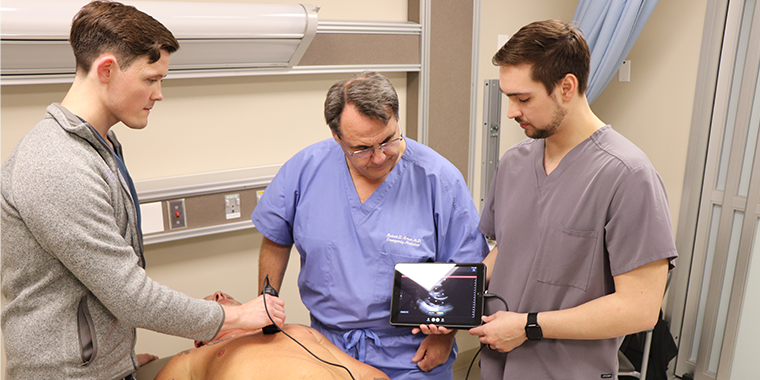In fall 2024, Kansas City University (KCU) launched a groundbreaking point-of-care ultrasound (POCUS) elective in partnership with Butterfly Network, Inc. The course combined hands-on scanning with AI-driven feedback using the Butterfly ScanLab™ platform—giving students step-by-step guidance and real-time scan assessment.
The response? Overwhelming. More than 300 students enrolled in its inaugural year.
Based on that success, POCUS is now a required part of the College of Osteopathic Medicine curriculum beginning in the 2025–26 academic year, ensuring every student gains early, consistent exposure to this essential skill. Each student will also receive their own handheld ultrasound probe at no additional charge, equipping them to start scanning with confidence from the beginning of their training.
From elective to essential
POCUS is rapidly becoming one of the most valuable diagnostic tools in modern medicine. With the ability to generate immediate images of the musculoskeletal system, heart and other organs, it allows physicians to assess patients quickly and accurately, often at the bedside. Yet many medical schools still don’t offer formal ultrasound training, leaving students to learn on the job during residency.
KCU is closing that gap.
“Point-of-care ultrasound is the stethoscope of the 21st century,” said Robert Arnce, MD, director of clinical integration. “We want our students to graduate fluent in this technology, not just acquainted with it. It’s a skill that gives them a competitive edge in residency and prepares them for everyday patient care.”
Personalized, tech-enhanced learning
The Butterfly ScanLab™ platform gives students on-the-spot feedback on probe placement and image quality. It also walks them through anatomical labeling, step-by-step scanning instructions and AI-guided comparisons—helping them refine their technique with every scan.
Students also complete supplemental coursework through Butterfly Academy, earning certifications and gaining confidence as they progress.
“You’re not just reading about anatomy. You’re seeing it in motion and applying your knowledge right away,” said fourth-year medical student Chance Benedict. “It’s a much more engaging and effective way to learn.”
Practical tools, real-world impact
KCU’s approach to ultrasound training goes beyond technology; it’s about preparing students to deliver care confidently in any setting. The handheld Butterfly iQ+ probe is compact, portable and powerful, allowing students to practice in a wide range of environments. Whether in simulation labs, early clinical exposure or rural rotations, students gain experience that prepares them for what they’ll encounter as physicians.
POCUS also plays a critical role in reducing patient anxiety, particularly in high-stress environments like emergency departments.
“A CT scanner can be overwhelming, especially for patients who are claustrophobic or in pain,” said Patrick Riscoe, a 2025 KCU graduate who used POCUS frequently during his emergency medicine rotation. “With point-of-care ultrasound, we can often scan at the bedside—no transport, no discomfort—and make faster, more informed decisions.”
With POCUS training now embedded in the curriculum and every student equipped with their own device, KCU is setting a new standard in hands-on, tech-enabled medical education. Students graduate with a vital clinical competency already mastered and the readiness to apply it confidently wherever they practice.
“POCUS isn’t something we’ve added just to check a box,” Arnce said. “It’s a skill that strengthens their training and directly impacts how they care for patients from day one.”
To learn more about how KCU laid the groundwork for this initiative, click here.




(0) Comments